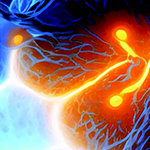News
Read the latest news from Northwestern University Feinberg School of Medicine’s basic science academic departments. The links below take you to articles where you can learn more about our faculty’s latest achievements.
Want more news? Sign up to our quarterly newsletter, Back to Basic, and be sure to connect with us on social media. Find us on Bluesky, LinkedIn and X.
To share your news, please take a moment to complete this form.
Biochemistry and Molecular Genetics
 11.20.2025
11.20.2025Northwestern Medicine scientists have uncovered a surprising link between a tiny cellular engine and the way cancer cells build the DNA they need to proliferate, according to a new study published in Molecular Cell.
 10.27.2025
10.27.2025A team of Northwestern investigators has discovered novel molecular underpinnings of a common oncogenic mutation in cancer, findings that may inform the development of new therapeutic strategies, according to findings published in Nature Chemical Biology.
 10.03.2025
10.03.2025Distinguished biochemist Svetlana Mojsov, PhD, the Lulu Chow Wang and Robin Chemers Neustein Research Associate Professor at the Rockefeller University, New York, has been named the winner of the annual $250,000 Kimberly Prize in Biochemistry and Molecular Genetics.
Cell and Developmental Biology
 10.31.2025
10.31.2025A Northwestern Medicine-led study has identified mutations in the gene CEP76 as a new cause of ciliopathies, shedding light on a complex group of disorders that affect multiple body systems, according to a study published in Science Advances.
 10.30.2025
10.30.2025Northwestern Medicine scientists have discovered how a specific transcription factor promotes genetic reprogramming and chemotherapy resistance in ovarian cancer cells, findings that may inform new targeted treatment approaches that inhibit this process and improve patient outcomes, according to a recent study published in The Journal of Clinical Investigation.
 10.16.2025
10.16.2025A Northwestern Medicine study has revealed a key mechanism underlying the development of motor neuron diseases, offering new insights into potential treatment options, according to a study published in the Journal of Neuroscience.
Microbiology-Immunology
 12.02.2025
12.02.2025A recent study has provided the first side-by-side comparison of how three major COVID-19 vaccine types differ in triggering immune responses and sustaining protection, according to an analysis published in JCI Insight.
 11.24.2025
11.24.2025Northwestern Medicine scientists have identified previously unknown genetic mechanisms that promote antimicrobial resistance in gonorrhea, findings that may inform the development of more effective treatment strategies, according to a recent study published in PLoS Pathogens.
 09.03.2025
09.03.2025A new Northwestern Medicine study has uncovered a surprising molecular link between HIV-1 and a protein fragment associated with Alzheimer’s disease, according to findings published in the Proceedings of the National Academy of Sciences.
Pharmacology
 11.03.2025
11.03.2025A new Northwestern study has uncovered how a key disease protein drives overactive nerve cells in neurodegenerative diseases like ALS and frontotemporal dementia.
 10.08.2025
10.08.2025Richard Smith, PhD, assistant professor of Pharmacology and of Pediatrics, has received the National Institutes of Health (NIH) Director’s New Innovator Award, which supports early-career investigators conducting high-risk and innovative research in the biomedical, behavioral or social sciences.
 09.17.2025
09.17.2025In a pair of studies, investigators from the lab of Huiping Liu, MD, PhD, have uncovered how specific cellular interactions in the bloodstream may be fueling the spread of breast cancer.
Neuroscience
 11.03.2025
11.03.2025A new Northwestern study has uncovered how a key disease protein drives overactive nerve cells in neurodegenerative diseases like ALS and frontotemporal dementia.
 10.13.2025
10.13.2025Seventeen Northwestern University Feinberg School of Medicine faculty members recently appointed to endowed professorships were formally recognized at a group investiture ceremony on October 3.
Among the distinguished honorees was Mark Bevan, PhD, who was invested as the Rose, James, Sarah, and Max Meltzer Professor of Neuroscience.
 09.02.2025
09.02.2025When Sandra Edwards of Oak Ridge, Tennessee, was diagnosed with early-onset Parkinson’s disease in her late 30s, it marked the beginning of a decades-long journey that has inspired a powerful legacy: a gift to support neurodegenerative disease research at Northwestern University Feinberg School of Medicine.